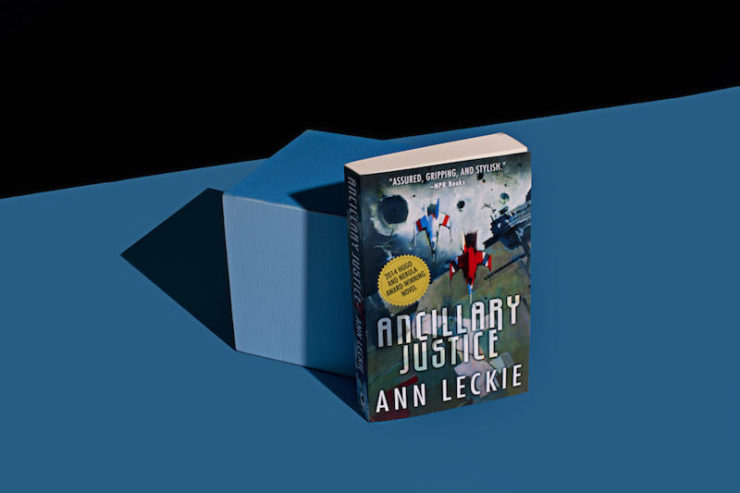“Book clubs never last—or if they do, it’s because people show up for drinks and idle chatter about anything other than the book,” the WIRED staff wrote in their announcement that they were kicking off their very own WIRED Book Club. Their solution? To meet online weekly and replace any idle chatter with fun, substantial commentary on that month’s pick—and if there are drinks, they’re thematic, because you know the WIRED staffers were probably drinking tea while discussing Ann Leckie’s Ancillary Justice in June.
Four months in, the WIRED Book Club seems to be going strong, thanks both to the fascinating conversations and highlights from the staff as well as their choice of reading material: They started with N.K. Jemisin’s The Fifth Season, followed it up with Ancillary Justice, then just wrapped up Patrick Rothfuss’ The Name of the Wind.
Each book is separated into a handful of sections to be read each week, with the comments for each post open to readers’ discussions of the book up until that point. After they finish that month’s novel, WIRED Book Club conducts a discussion with the author, guided by a mix of reader questions and staff commentary. Those interviews have brought us gems like Leckie giving the best explanation I’ve seen so far for the Radchaai’s adherence to gloves as part of their dress:
Yes, please explain the gloves.
Gloves for them are like pants would be for us. You wouldn’t go out of the house without your pants on—it’s just not decent. If you were to ask a Radchaai why they wear gloves, they would say, “Well, it’s decent. Hands are dirty.”But you don’t spend any time in the book explaining that. Was that intentional?
It was. I feel like that adds a kind of depth to the world-building. If you think about our interaction with our own culture, we don’t know the reasons for a lot of the things we do. Every time we switch on a light, we don’t talk about the invention of electricity and Thomas Edison.
How dreams and real life intertwined to inspire Jemisin’s Broken Earth Trilogy:
In the Broken Earth books, people called orogenes have the power to stop earthquakes. Yet they’re reviled by society. How did you come up with that?
Pretty much the same way I’ve gotten most of my other major world-building ideas: partially as a dream, partially me trying to make sense of the dream. I had a dream of a woman walking toward me in the badass power walk that you’ve seen in any blockbuster movie—these grim-faced people walking toward the camera with stuff exploding behind them. But instead of stuff exploding, it was a mountain moving along behind her. She looked at me like she was really pissed, like she was going to throw the mountain at me. Who is this woman who can control mountains? How can she do that?Where did you go for answers?
I spent three months learning everything I could about seismology. I took a seismologist out for lunch. I went to Hawaii and visited four volcanoes. Then I started thinking about the woman herself and what would make her so angry. That was the summer when, just about every other minute, there was the unjustified killing of a black person at the hands of police. Ferguson was happening, and I was angry myself. I wanted to throw a mountain myself. So a lot of that went into the world-building and the story.
And analyzing characters’ self-mythology with Rothfuss’ input:
How much is Kvothe playing up his own story? Mythologizing his own self?
It is very fair to wonder, How much of this is real? How much of this is true? Unfortunately, any answer that I gave to that would be destructive to the story.Can you say anything on the subject?
However people read the book makes me happy, as long as they enjoy themselves. But I will say that one of the reads I find a little irritating is where they think, “Oh, he’s the best at everything. Oh, he’s telling this story where he’s so cool all the time.” Are you reading the same story that I wrote? Because, like, he is constantly shitting the bed. He is full of terrible decisions all the time. If I were gonna go back and mythologize my life, I would leave out so many of the terrible choices that I made.
What’s interesting to note is that so far each month has begun a new series, even though each of the installments has one or more sequels. Instead of jumping right into The Obelisk Gate, Ancillary Sword, or The Wise Man’s Fear, the WIRED staff asks and answers whether they would continue the series based on their experience of the first book. Perhaps down the road they’ll choose sequels as their monthly book club picks, but I appreciate how each month is devoted to a new author and a new world.
If you want to jump in on the fun, the WIRED Book Club is a week or so into Ada Palmer’s “future-paleo sci-fi” novel Too Like the Lightning! Here’s where you can get started, and here’s the first discussion post.










